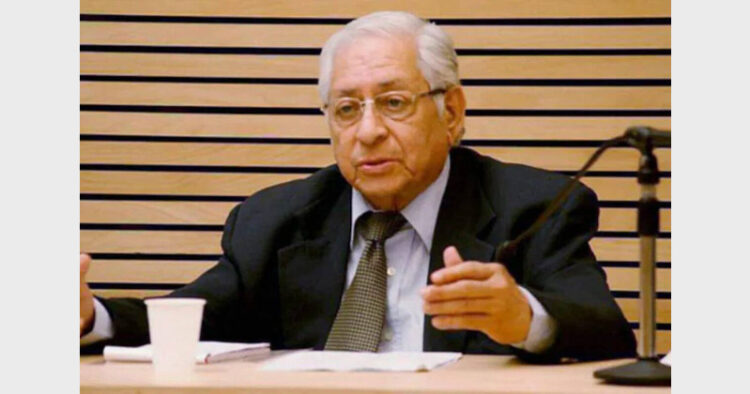New Delhi: Death must be a private affair, or so. On the issue of ‘privacy judgment’, Late Soli Sorabjee used to refer to cases related to litigation on Aadhaar cards. Once he said, the essence of the right to privacy is the right to be ‘left alone’. In his journey to eternity, he is perhaps alone though around the same time we have scores dying due to Covid19.
But privacy – as he underlined – will remain one of the most cherished rights of democracy.
A committed legal luminary to the cause of civil liberty, eminent jurist Soli Sorabjee had opposed Emergency strongly. Known for his anti-Congress stance, he first became the Attorney General of India, from 1989-90 under V P Singh government and then from 1998-2004 under Atal Bihari Vajpayee. Sorabjee passed away on Friday morning. He was 91.
Delhi’s media corps would have fond memories of the man, who called himself a ‘good friend’ of journalists, but also someone who would court controversies for his candid remarks at times both within the courtroom and also outside.
Though he occasionally fought with Ram Jethmalani, Sorabjee had trust of the then PM Vajpayee and Home Minister L K Advani during the NDA regime. But around the same time, he would often court controversies as well.
Such was an episode during the hearing on the Ram Temple-Babri Masjid dispute in the Supreme Court in 2002.
In one of the hearings, he told a bench of three judges that the Vajpayee government sought to give a special concession and allow ‘Bhoomi pujan’ at Ayodhya as sentiments of the majority were involved.
“…..the object is not to rake up the past,” he had told the court perhaps in reference to 1992 demolition of the disputed structure and riots thereafter.
One of the judges, Justice G B Pattanaik had actually provoked Sorabjee when he said, “The Rashtrapati Bhawan belongs to you, so is the acquired land at Ayodhya, will you allow Bhoomi pujan at Rashtrapati Bhawan?”
Sorabjee had shot back: “This is not Rashtrapati Bhawan”.
Coincidentally, all these arguments were taking place when Godhra railway station inferno had already taken place on Feb 27, 2002 and the mayhem also followed in Ahmedabad and various other parts of Gujarat.
Sorabjee later told journalists that he knew of the public sentiment and thus made the offer before the apex court as Bhoomi Pujan could have ‘brought in some calm and amity’. Of course, opposition parties, the Left MPs in particular were up in arms, saying Sorabjee was acting like a “BJP member”.
Parliament was disrupted. BJP’s allied Trinamool Congress and TDP also started making noise.
Sorabjee late had said, “I was not sharing anyone’s views….it was as an officer of the court. Neither the government or the VHP had given him the briefing”.
However, it was claimed that top BJP leaders had approved of the ‘suggestion’ for Bhoomi Pujan mooted by Arun Jaitley. The BJP leaders discussed with Sorabjee and concluded that the 1994 Supreme Court judgement put no restrictions on the subsequent use of the ‘undisputed land’ in Ayodhya.
Apparently, some leaked media reports claimed Pramod Mahajan had opposed the move.
Years later, Sorabjee would laugh over the episode and once told some journos in presence of Late P A Sangma, “Often these things happen, a lawyer knows how to protect his client’s interest and prestige by offering his own head”.
On a different plane, Sorabjee used to say that ‘freedom of the press’ is not specifically articulated in Indian constitution. His argument was while it is mentioned in statues all over the world, the Constituent Assembly leaders believed that the freedom of the press was contained in the guarantee of ‘freedom of speech and expression’ and thus need not be specifically mentioned.
“Our Supreme Court in more than one decision has deduced freedom of the press from Article 19(1)(a) on the premise that it is implicit in the said guarantee,” the eminent lawyer used to say.
Thus, by “creative judicial interpretation”, he would say – the freedom of the press has been given the constitutional status of a fundamental right.
Sorabjee also had a good sense of humour. For repeated ‘stay orders’ from the courts, he would often say, “Everything has been stayed in India, what is the point …..”.














Comments